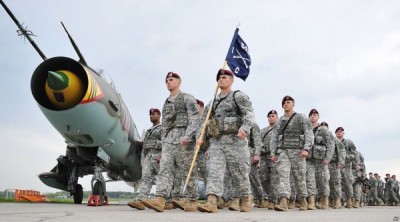US, NATO Boost Military Operations near Russia’s Borders: “Peace and Stability” according to Pentagon official

The US military and its NATO allies have increased military operations near the borders of Russia in order to keep “peace and stability” in the region, a Pentagon official says.
The unnamed official told RIA Novosti on Tuesday that the United States was “transparent” in its military operations.
“Current US European Command efforts through Operation Atlantic Resolve are a demonstration of our continued commitment to the collective security of NATO, the long-term peace and stability in the region,” the official said.
“The United States took several immediate steps to demonstrate solidarity with our NATO allies, such as augmenting the air, ground and naval presence in the region, and enhancing previously scheduled exercises.”
The head of the Russian Defense Ministry’s joint military command center, Lieutenant-General Mikhail Mizintsev, said that NATO has increased military activity near the Russian borders.
He added that the alliance’s flights have doubled to about 3,000 in 2014.
Relations between Moscow and the West have been strained over the crisis in Ukraine.
The United States accuses Russia of sending troops into eastern Ukraine in support of the pro-Russian forces, an allegation denied by the Kremlin.
Last week, the Pentagon threatened Russia with redeploying nuclear cruise missiles to Europe, accusing Moscow of violating two arms control treaties.
White House spokesman Josh Earnest said on Tuesday that US President Barack Obama would sign anti-Russia sanctions into law.
“The president does intend to sign the bill,” Earnest said.
The announcement followed a unanimous approval of the Ukraine Freedom Support Act.
The bill aims to put more pressure on Moscow by authorizing more sanctions on weapons companies and investors in its high-tech oil projects and to provide the Kiev government with extra military aid.

